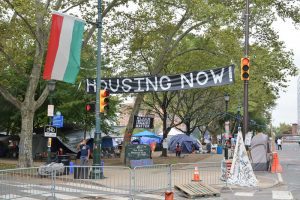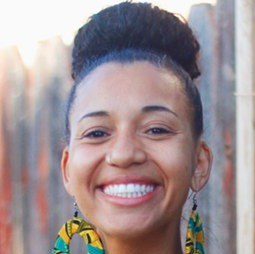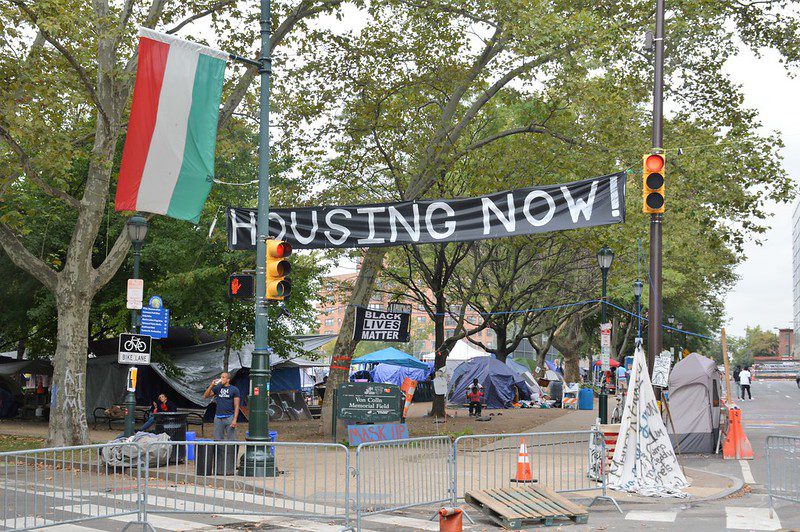
Photo by Michael Stokes via Flickr, CC BY 2.0
For the millions of Americans living at or below the poverty level or precariously close to it, the exploitative mindsets that are everywhere in our economy have also done tremendous harm in the realm of housing. The COVID-19 pandemic and the lackluster government response has disproportionately impacted low-income communities, especially people of color, and highlighted the need for accessible, permanently affordable housing. However, the housing crisis did not emerge out of nowhere. It is the result of centuries of entrenched racism, cisheteropatriarchy, and capitalism that prioritizes the profits of the few at the expense of the many. But across the country, from Philadelphia to Oakland, activists and community members are rising up to demand radical change. In some cases, they have not only demanded it, but won. Below is an excerpt from an Oct. 28 PolicyLink webinar “Facing History to Advance Housing Justice” moderated by James Crowder. The discussion includes Philadelphia Councilwoman Helen Gym, Aviva Kapust of the Village of Arts Humanities in Philadelphia, Christina Livingston of the Alliance of Californians for Community Empowerment (ACCE), and Tara Raghuveer of the Kansas City Eviction Project and People’s Action Institute. They discuss their experiences and offer insight on how the movement for housing justice can best move forward. (To listen to the full webinar, including Amy Chew’s discussion of PolicyLink’s two recent reports on housing disparities in California and Philadelphia, visit this link.)
James Crowder: Could you talk about what housing justice means to you and some of the work that you’re doing that you think advances housing justice?

Philadelphia Councilwoman Helen Gym
Helen Gym: I bring you sorrows from the city of Philadelphia, where a few nights ago, a young 27-year-old man named Walter Wallace was shot in his Cobbs Creek neighborhood after suffering from a mental health illness.
This moment reinforces more than ever that the way we look at housing and our communities and neighborhoods is the way that we look at the people within them. This isn’t about bricks and mortar. It’s about people’s lives and about how we uplift and value them, especially for Black and Brown and immigrant communities in our city, young people, family members, and for our seniors and our elders that are our most vulnerable.
Housing justice is about building a relentless organizing base of people fighting for housing as a basic human right and recognizing that a housing justice movement that is not simultaneously a Black Lives Matter movement, that is not simultaneously a public education movement, that is not simultaneously a justice movement for LGBTQ families, a fight against transphobia and addiction and the devaluing of people who suffer from mental health issues in our communities is not a justice movement at all.
Our work has always lived in movements in the streets and less so with elected officials, politicians, and politics that are falling short in this given moment. When I came into city council in 2016, I thought carefully about how councils are an elected office and where it falls in terms of this hierarchy of federal, state, and local work. There’s a lot that you can do at the local level.
We wanted to push the boundaries of what that would look like. We had to because the answers aren’t coming from Ben Carson at HUD or from a GOP-controlled legislature that has left housing behind time and time again. So here in Philadelphia, we started working in renters’ rights, which is an area where we have fallen behind.
[RELATED: Activists Win Control of Vacant Philadelphia Buildings. Now What?]
Philadelphia, like many major American cities in the last 10 years, has seen a dramatic shift between a majority homeownership city to being a 50/50 city and joining the ranks of a Renter Nation in the U.S. So, for us it started out with working on tenant legal defense. We established a right-to-counsel law, fixed tax abatements and giveaways for wealthy developers, fixed lead laws and fought to have landlords accept [housing] vouchers.
Seventy-four percent of the people we serve are Black. Seventy percent are women and over half are parents and caregivers. We fought hard during this COVID crisis to meet this moment and at the end of the day, it’s the people that are going to drive this through.
Crowder: Christina, could you talk about what housing justice means to you and what ACCE is doing to advance housing justice?

Christina Livingston, Deputy Director at Alliance of Californians for Community Empowerment
Christina Livingston: Sure. Before I start, I want to thank both James and Helen for bringing the name of Walter Wallace into this space and the violence that Black people and other people of color are facing now and have always faced is not separate from this fight and it’s important that people understand that as we’re out in the streets fighting to end violence from police, the violence that people of color face in terms of housing policy is just as impactful and in fact affects millions more people.
The outcome of housing justice is that everybody can live in a safe and affordable home that is not subject to toxins, in a community that has resources, where there isn’t violence that people face when they walk out the door, from the environment or at the hands of police or other actors. That folks’ homes are not making them susceptible to dying early, that they are not in food deserts, that they have access to quality health care and education around them.
It’s about community housing. It’s about what community we want and, therefore, where you get to go home and lay your head down and understand that you are protected even outside of those walls.
Thank you, Helen for raising this up that it starts with building a base of people who are affected, who can talk about what is happening to them, and can put forward solutions. You cannot start with policy, you have to start with people, people who are bearing the brunt of a system that does not look at housing as a human right and instead looks at housing as a means of profit. We’ve got to reverse that.
It’s also important that we that we come up with policies that are not colorblind. Colorblindness leads to increased racist outcomes. So, we’ve got to be clear about what equity means and clear about the kinds of solutions we are striving for.
Lastly, if we are not pushing to make housing a human right, we will continue to stay in this space. We have to think about what rights mean in terms of people’s intrinsic access to it. We cannot continue to operate in a structure in which developers can say, “There’s a housing shortage in California, so we’re going to do trickle-down housing and just perpetuate the cycle that we’re in.” What does it mean to produce housing as a human right? And, therefore, how are all of the systems and policies that we are using changing to reflect a human right to housing?
Crowder: Tara, if you could introduce yourself and talk about what People’s Action is doing that advances housing justice.

Tara Raghuveer, Director of KC Tenants
Tara Raghuveer: My name is Tara Raghuveer and I use she/her pronouns. I am the Homes Guarantee campaign director at People’s Action. I also helped to found and now run a group of radical tenants in Kansas City, Missouri, called KC Tenants.
Broadly speaking, housing justice is an end to racial capitalism, it’s a complete unraveling of the systems that shape the social order of the day.
There’s a quote I want to share with you. It says, “Housing shortage is no accident. It’s a necessary part of the social order where private splendor and public squalor is the order of the day. Only forcible overthrow of all existing social conditions will enable us to solve this problem.” This is my maternal grandfather in Mysore, India, halfway across the world in 1977 publishing a book that he wrote in 1992 right around the beginning of my life. I share that to say that the struggle that Helen, Christina, and the rest of us are organizing around is a long, international struggle and it’s obviously an intersection of struggle. Housing justice is this fight against racial capitalism. It’s a fight for a homes guarantee. This is the campaign that I run at People’s Action with a simple premise: We live in the richest country in the history of the world. We can and we must guarantee that everyone has a home. Period.
It’s a simple premise. But obviously, one that’s complicated by the realities of racial capitalism and of the social order of the day, whereby a conspiracy of the profiteers limits our imagination about how we can deliver social goods like housing to the people. We are told that the private market is the only way. We are told that only through private innovation and industry can people have what they need. We’re told that housing is and always has been a commodity. The homes guarantee is a campaign that seeks to transform housing from a commodity to guaranteed human right, or public good, and the way that we get there.
Through my other hat, I am the organizer at KC Tenants, which as I said is a grassroots base of tenants in Kansas City. We are led by poor and working-class people who live the experience of what housing injustice means and are the experts at their own liberation. The people in my base of KC Tenants are the leaders that we need. They have ideas like a homes guarantee that sound radical to other people, but these leaders know that these ideas are not radical. It’s just what they are owed, and by investing in leaders like the leaders in KC Tenants, the leaders in ACCE, that’s the way forward.
Organizing is about transforming personal pain or private pain into public power. It’s also the way forward to win the homes guarantee that we need.
Crowder: Helen, you mentioned that what’s needed first and foremost is the relentless organizing base. What advice would you offer to elected officials such as yourself that want to move into this space? What’s most important? What role should elected officials play?
Gym: I come from a world where collaborative organizing and governance is a strategy. I cut my teeth in Philadelphia’s Asian American and immigrant rights movement, and a public education movement where most communities felt marginalized from processes, policies, and decisions that were made about them.
We learn to independently organize and mobilize for a set of policies that reflect what we need in this moment. Our elected officials recognize that right now. We have not done significant growth in housing policy at the federal level in 50 years at least. We are so far behind. Our communities are learning they are closest to what is going wrong, where all the problems are, who’s being left behind. And so, the failure to recognize that they have a tremendous amount of answers and strategies is a failure on our part. Our politics, our government, and resources are falling short. When that happens, you need a broader movement to mobilize for the money that you need.
A quick example: Municipal governments and their budgets are hollowing out right now as we lose tax revenue. One of the first things cut in our mayor’s suggested budget was the housing trust fund. We mobilized amongst all of our communities to push for a reinvestment back into the housing trust fund of the $20 million that would then go for paying for the local rent vouchers that are paying for rent assistance, and subsidies to pay for the diversion program and housing counselors that we’re seeing right now. You need both.
You need a mobilizing base to get the resources that you need. It’s such a mistake for people to say, “I can’t afford it.” That’s when we have to organize even harder to make it imperative that priorities come from the people and don’t come from a budget sheet within government. [The priorities] come out of a moral vision for the people, so I’m grateful to be part of Local Progress, which has been working hard to educate local officials [on] how to do collaborative governance. We just had a huge movement over the last five months by organizers who took over an encampment area and demanded to reclaim PHA [Philadelphia Housing Authority] housing that was sitting abandoned and unused.
But we can’t just talk about racism, we can’t talk about overthrowing racial capitalism, without recognizing that this is going to take an overwhelming force of the people. It’s going to take protest and us unifying with other communities and their own justice movements to form a true transformation.
As an elected official, to any elected official out there: Let go of the preciousness at this position, we are too far behind, and there’s so much to gain if we merge our voices and let go of this idea that we have to be the “lead” here. We play an important role on the inside to not compromise, to keep the focus on and translate the people’s vision into policies, and to hold our government institutions accountable. But the people have to lead.
Crowder: Aviva, as we’re talking about advice to give to folks in this moment, if you could introduce yourself and talk about some of the work that the Village of Arts and Humanities is doing and how you guys approach community engagement.

Aviva Kapust, Executive Director of the Village of Arts Humanities in Philadelphia
Aviva Kapust: We are an arts and culture organization born out of a need for innovative community development. We’re attacking housing justice from a hyperlocal standpoint. We’re looking at 40 percent vacancy in our neighborhood, which is way higher than what we’re talking about across Philadelphia, and the majority of those properties are publicly owned.
We are looking at how we can begin to take public property to create permanently affordable housing and up the ante to provide pathways to home ownership for people living at 30 percent AMI. We often look at permanently affordable housing for low-income individuals and forget that low-income is not 80 percent AMI, it’s not even 50 percent AMI. We’re talking about 30 percent and below, and we need to be talking about how we expand the idea of who gets to own what, and how power comes into play there. We need to expand what we imagine that to look like and having ownership not be something that is individualistic and outside of the networks we know exist for people who are of means and have massive interconnected support to create assets and create wealth for themselves. How do we collectively own property and assets and steward them in spaces like the Fairhill neighborhood of Philadelphia, which is at the ground zero for every socioeconomic challenge you could name?
Then, because The Village owns or stewards about 4 and a half acres of property in the neighborhood, we are working over the next year and a half to convert properties and model this activity for the city as another option for how we can begin to look at homeownership and upward mobility through anchoring people in place.
Crowder: How can we start to shift the narrative so that, rather than the corporate profits being the motivation, people start to see housing as a basic human need, that should be addressed?
Livingston: We started to tackle it at the end of last year as we supported Moms 4 Housing in the occupation of the home in West Oakland. These were marginally housed and homeless women with children who looked around West Oakland and saw homes that were sitting vacant while encampments full of mostly women and children, people of color, black people saying, “why should we be in the streets while these homes are sitting vacant, waiting for property values to increase to gentrify the neighborhood and push out the existing Black people in the community? We are not going to do that.” And they moved into those homes. They were crystal clear that this was not about just one of them receiving the home. They were clear that this was a community problem that they can see is increasing throughout the state. Homelessness was exploding, and people were happy to talk about the problem of homelessness but were not interested in talking about ways of solving that problem.
[RELATED: Homeless Mothers in California Show How Radical Housing Activism Becomes Lasting Change]
So, they were clear: We have to end speculation in Oakland. We have got to stop allowing corporate landlords to come in, buy a property, push people out of the neighborhood, and then just sit on them, which also inspired Reclaim Our Homes LA to take over publicly owned homes; a dozen of them or so just this weekend got keys to those homes. That’s a victory, but we have to look at the number of vacancies, at the profit that’s being driven. Let’s look at the fact that this state is in a recession yet property values are not going down. What is that about? How is it possible that homeownership is decreasing for individuals [yet] corporate landlords are able to come in and rents are increasing? When Wall Street becomes a landlord, they are going to find every means possible of making that a profitable venture.
It should not be.
We started to push [for] solutions like the land trust in Oakland, which we obviously have to figure out how to finance. We’re thinking about public banks. The important thing is that we can have the conversation on the ways that they have been having it like on their terrain.
The more people experience the damaging effects of allowing corporate landlords into our neighborhoods, the broader base there is to organize around. I see this the way that I saw the protests over the summer: it cannot just be the people who are affected who are putting themselves on the line.
They cannot be the only people blocking the courts from evictions, they can’t be the only people taking on corporate landlord giants. We have to have homeowners. We have to have people who are not being affected out on the front lines with us.
The conversation is not just about publicly owned land. What are the right policies? Who gets to be a landlord? Is what are you doing or not doing potentially perpetuating the cycle by not standing up with those who are being impacted by it?
Crowder: Tara, this conversation around corporate landlords and housing as a basic human need has raised some questions in the chat around structure and what that could look like. A lot of the work you do is at the federal level. Could you speak to what it would take for us to have a transformative change at the federal level that yields some of the things that we’re talking about here?
Raghuveer: A lot more of this is spelled out in detail in the Homes Guarantee briefing book which we put out in September of 2019. Frankly, a lot of the numbers that we were talking about in September 2019 now need to be blown up because of the impact of COVID and the economic crisis that has followed and that we’re still living in.
One of the main things that we call for in the Homes Guarantee is 12 million new units of social housing, which is housing that’s permanently off of the private market, not available for speculation. There are plenty of examples of this across the world. Vienna is one that you shouted out, but there are even more. Social housing has examples of decades-long, successful experiments in social housing that’s treated not as a commodity but guaranteed as a public good off of the private market.
[Related: Housing Justice Organizers Don’t Want to Return to ‘Normal’]
So, one of the first and most important things that we call for is this infusion of public or social units because we don’t have a lot of that, and what little we have of public housing has been neglected for years. And we have this same austerity fight at the federal government level that we do in states and localities where people say, as Helen was saying, “We don’t have the money for this.” We all know that is BS. We need to start calling it what it is. We don’t need to tax rich people in order to get the money to build social homes. We can print the money as Stephanie Kelton, and others have helped us identify because we produce our own currency at the federal level. At the state and local levels there are different needs. But, as Christina was saying, we can get the money from the people who are extracting from our communities. We can tax the hell out of them if they’re trying to speculate and make sure that money is then reinvested in the community and guaranteeing [that] some of these homes [are taken] off of the private market. That’s just one example. There’s way more in the Homes Guarantee briefing book.
I also want to say what Christina is talking about with Moms 4 Housing, and the radical actions that were taken in Oakland, Los Angeles, and in Philadelphia over this summer are exactly the path that we need to get there. We’re not getting a homes guarantee anytime soon, unless people go and demand it. Let me just not mince my words: Even the Democrats are taking money from Wall Street and real estate. They are not for a homes guarantee. The people will have to force that accountability. And that starts with us taking radical actions. These times call for radical actions.
And again, switching to my other hat at KC Tenants Union, we’ve been begging and pleading for an extension of our eviction moratorium, which expired back in May. Evictions have been happening in Kansas City, Missouri, since June 1 of [2020]. In the middle of a pandemic and COVID cases are higher now than they were in March when we first fought for and won an eviction moratorium. We’ve escalated in every way that we could think. We’ve written letters. We’ve lobbied. We had a vigil at the judge’s house. We organized members of his Bible study. He will not give us what we need. So, we decided to shut it down. At the end of July, we went and we shut down eviction court. Two weeks ago, we went and we shut down eviction court. It is not the entirety of the solution. But we bought weeks or months of time for 138 families on the eviction docket two weeks ago and not to put out too big of an announcement about this, but we will soon be doing that on a regular basis.
For any of you excited by Christina’s question about what you are or are not doing right now if you don’t have an avenue to take action in your local community, you should be signing up for a phone bank with KC Tenants Union to shut down online evictions in the coming weeks. And you can be in touch with us via social media or otherwise if you want info on how to do that.
Crowder: Aviva, I wanted to give you the last question before I turn over to the audience for Q&A. You look a little different than all the other panelists on the panel today and I’m curious, what advice or counsel you would give to white allies that want to be in this space advancing housing justice.
Kapust: What Christina said about what to stop doing is an important exercise. It is easy to think that you can come up with all of the solutions, like these aren’t intractable problems that have been caused by white people for so long. So, thinking about what you can stop doing that is perpetuating the problems is incredibly important.
I’m here in place of my amazing co-director, Michaela Pommels, who couldn’t make it today. And so, on behalf of her, I’ll also say that she would be talking about trust right now. That you know you have to walk into these situations hopefully as an ally and an asset, but knowing that you as a white person are not going [to] and shouldn’t necessarily be trusted.
That progress and this work will only move at the speed of trust. So, learning from people like Michaela, Christina, Tara, and Helen about how to build trust among the groups of people, communities that you might be working with is important. This work is going to happen over a long period of time. It can’t take a lot of time for us to get to solutions, but we have to manage them and steward them and maintain equitable solutions for hundreds of years to come.
One of the projects that Michaela and I are working on at The Village, called 100 Families, starts to get to that idea. It’s looking at how we can invest in 100 families with 100 homes and 100 jobs for 100 years and thinking about the fact that every single move we make as White people, as all people, has an effect that will impact others for centuries to come. And that is what we are looking at. Thank you.
Crowder: Thank you so much. And now let’s head over to Chione for the abundance of questions in the chat.
Chione Flegal: Good afternoon. I’m Chione Flegal, a managing director at PolicyLink, and it’s been wonderful to hear this conversation today. We have way more questions than we are going to have time for. So, I encourage you all to be answering each other’s questions even as we’re having this conversation.
I’m going to pull a couple out. Ashley Cox asks: There is so much public infrastructure that is tied to housing as a commodity, for example, real estate taxes that local and county governments rely on. Could everyone expand upon how housing as a right can be structured or are there national or international examples that you can point to?
Livingston: There are, in every system, lots of things built on top to make it difficult to make the switch from commodity to right. It’s about getting down to the core of what it is that we need. We can’t assume that we’re not going to take any losses as we switch. This is sort of like the conversation around Green New Deal. There will be some discomfort along the way, there will be some people who are not as advantaged under the new system as they were in the old. We have to be clear about what it is we’re trying to get to and push through that in a way that’s not about discarding people who might be, you know, sort of on the end of it. Equality feels like oppression when you’re losing things, but really think about how we can hold one another into the space. There are lots of places where people have tried things. I can’t say what the right answer is. I do think that having the discussion starting at a local level and including all folks who would be stakeholders, but centering people who are most affected is the right path.
We should be careful not to fool ourselves into thinking that people who are affected are all affected in the same ways and therefore will want the same solutions. That’s just not true. We organized poor white people, Black people, poor Latinx people, indigenous people, API people. And when we started having a conversation about what would a Black New Deal look like, [that] raised all kinds of stuff for people. So, I just want to say the conversations have to be clear. They have to be nuanced. They have to be principled and that’s how we get to the solutions which if they did exist, we would just roll them out. So we can’t sort of shocked by doing the hard work to find the solutions. Point to something that’s happening, even if it’s working somewhere else. It may not work where you are. It is about the conversations, the organizing, and wanting to hold everyone with dignity.
Raghuveer: I’ll just jump in to add that this is a present tension in our organizing right now. When we go and shut down eviction court, the counterargument that we hear from the other side is, “But there are these mom and pop landlords and they need to maintain their business because this is their retirement.” There is some truth in that, although we push back on the big picture because most of the evictors in Kansas City happened to be the big corporate Wall Street landlords that Christina was talking about earlier. The mom and pops are used as a political wedge. That impacts our local elected officials and they are attuned to their concerns because there are people in our community.
But we have to ask ourselves what we are prioritizing if we allow evictions to occur right now. Again, they’re occurring in my community today, right? What we are prioritizing when we allow evictions is one person’s profits over another person’s life. And there’s no two ways about that. One person’s profit over another person’s life. What we’re saying is this person is more valuable to us. And this person is more disposable to us. Each and every single time that happens, [it] is an act of violence. And we all know the communities [it] impacts the most: it’s poor and working-class communities. And it’s Black and Brown communities. So, it’s our job to intervene. It is going to bring up tensions that Christina was talking about. The local owners are not happy with us right now because we are disrupting their ability to do their business. We believe their business should be disrupted just like every business has been disrupted during this pandemic of unprecedented scale and size and depth.
Ultimately we’ve got to think about our priorities and design policy that prioritizes people over profit. And that’s going to be uncomfortable. It’s going to mean that some people see lesser returns on their investments than they saw before. Some people are going to lose their investments entirely. And that’s the cost of justice, but we have to be comfortable with that. We need to be clear about that. This is always about who has power. The people in power are the people who guide every single discussion and decision in the world as it is, and what we have to do as organizers is subvert who has power and that again is going to be uncomfortable. That’s going to raise tensions and it’s a necessary part of building a better world.
Gym: There are things that we can and should do on public land. Public buildings should be permanently affordable, we should prioritize housing that is permanently affordable. When we talk about housing affordability, we need to say that it’s defined for the people who are zero to 30 [percent] AMI. But for the poorest of our members, this is not about affordability for the market. It is about what is affordable to people who need it the most. So reorienting our conversations and recognizing that language has been co-opted even within policies that are meant to be supportive is important.
In the spring, Philadelphia passed a bold eviction moratorium through Aug. 31. Since Sept. 1, we’ve been fighting tooth and nail to reinstate that eviction work. And even amongst our democratic council body, it’s not a partisan issue; it is a question of whether people deserve to be evicted right now. They want to limit [eviction protections to those facing] a COVID hardship, which is arbitrarily decided based on when people got poor, when we know that people faced hard times before this COVID crisis hit, that they were poor at numbers that made Philadelphia the poorest large city in the country. The people who are evicted—we know who they are: 75 percent of them are Black, 70 percent are women, over half of them are caregivers or parents. It’s unconscionable to say that some people are more deserving of protections than others, but we are. A majority of my council body will not move forward right now on a blanket eviction moratorium even though we have skyrocketing rates. Even scientists are begging us to take action.
Kapust: We need to think about the next generations of people who are going to be dealing with this, and the education crisis, specifically in Philadelphia, is not helping with that. We should be thinking about new education and organizing for young people around the housing crisis to understand what promotes housing stability. That might begin to turn the tide for us in the future.
This transcript was edited by Shelterforce Associate Editor Brandon Duong. To listen to the full webinar, visit this link.






We have to think about what rights mean in terms of people’s intrinsic access to it.